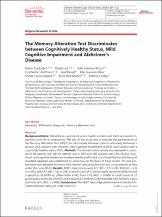| dc.contributor.author | Custodio, Nilton | |
| dc.contributor.author | Lira, David | |
| dc.contributor.author | Herrera Perez, Eder | |
| dc.contributor.author | Nuñez del Prado, Liza | |
| dc.contributor.author | Parodi García, José Francisco | |
| dc.contributor.author | Guevara Silva, Erik | |
| dc.contributor.author | Castro Suarez, Sheila | |
| dc.contributor.author | Montesinos, Rosa | |
| dc.contributor.author | Cortijo, Patricia | |
| dc.creator | Cortijo, Patricia | |
| dc.creator | Montesinos, Rosa | |
| dc.creator | Custodio, Nilton | |
| dc.creator | Lira, David | |
| dc.creator | Herrera Perez, Eder | |
| dc.creator | Nuñez del Prado, Liza | |
| dc.creator | Parodi García, José Francisco | |
| dc.creator | Guevara Silva, Erik | |
| dc.creator | Castro Suarez, Sheila | |
| dc.date.accessioned | 2016-03-15T12:28:32Z | |
| dc.date.available | 2016-03-15T12:28:32Z | |
| dc.date.issued | 2014 | |
| dc.identifier.citation | Custodio N., Herrera D., Nuñez L., Parodi J., Guevara E., Castro R., Montesinos R., Cortijo P. The Memory Alteration Test Discriminates between Cognitively Healthy Status, Mild Cognitive Impairment and Alzheimer’s Disease. Dement Geriatr Cogn Disord Extra 2014; 4: 314–321 | es_PE |
| dc.identifier.uri | https://hdl.handle.net/20.500.12727/1539 | |
| dc.description.abstract | Background/Aims: Dementia is a worldwide public health problem and there are several diagnostic
tools for its assessment. The aim of this study was to evaluate the performance of
the Memory Alteration Test (M @ T) to discriminate between patients with early Alzheimer’s
disease (AD), patients with amnestic mild cognitive impairment (a-MCI), and subjects with a
cognitively healthy status (CHS). Methods: The discriminative validity was assessed in a sample
of 90 patients with AD, 45 patients with a-MCI, and 180 subjects with CHS. Clinical, functional,
and cognitive studies were independently performed in a blinded fashion and the gold
standard diagnosis was established by consensus on the basis of these results. The test performance
was assessed by means of a receiver operating characteristic curve analysis as area
under the curve (AUC). Results: M @ T mean scores were 17.7 (SD = 5.7) in AD, 30.8 (SD = 2.3)
in a-MCI, and 44.5 (SD = 3.1) in CHS. A cutoff score of 37 points had a sensitivity of 98.3% and
a specificity of 97.8% to differentiate a-MCI from CHS (AUC = 0.999). A cutoff score of 27
points had a sensitivity of 100% and a specificity of 98.9% to differentiate mild AD from a-MCI
and from CHS (AUC = 1.000). Conclusions: The M @ T had a high performance in the discrimination
between early AD, a-MCI and CHS. | es_PE |
| dc.format.extent | pp. 314–321 | es_PE |
| dc.language.iso | eng | es_PE |
| dc.publisher | Dementia and Geriatric Cognitive Disorder Extra | es_PE |
| dc.relation.ispartof | urn:issn:1664-5464 | |
| dc.relation.ispartofseries | Dement Geriatr Cogn Disord Extra;n. 4 | |
| dc.relation.uri | http://www.karger.com/Article/FullText/365280 | es_PE |
| dc.rights | info:eu-repo/semantics/openAccess | es_PE |
| dc.rights.uri | https://creativecommons.org/licenses/by-nc/4.0/ | es_PE |
| dc.source | REPOSITORIO ACADÉMICO USMP | es_PE |
| dc.source | Universidad de San Martín de Porres – USMP | es_PE |
| dc.subject | Demencia | es_PE |
| dc.subject | Diagnóstico diferencial | es_PE |
| dc.subject | Trastornos de la memoria | es_PE |
| dc.subject | Enfermedad de Alzheimer | es_PE |
| dc.subject.ddc | 616.8 - Enfermedades del sistema nervioso y trastornos mentales | es_PE |
| dc.title | The Memory Alteration Test Discriminates between Cognitively Healthy Status, Mild Cognitive Impairment and Alzheimer’s Disease | es_PE |
| dc.type | info:eu-repo/semantics/article | es_PE |
| thesis.degree.name | Medicina Humana | es_PE |
| thesis.degree.grantor | Universidad de San Martín de Porres. Facultad de Medicina Humana | es_PE |
| thesis.degree.discipline | Medicina | es_PE |
| dc.identifier.doi | http://dx.doi.org/10.1159/000365280 | |
| dc.subject.ocde | https://purl.org/pe-repo/ocde/ford#3.02.00 | es_PE |








